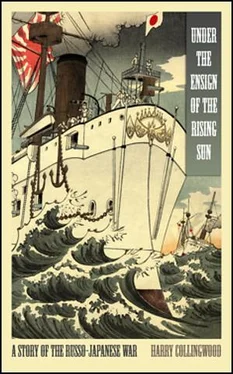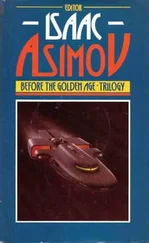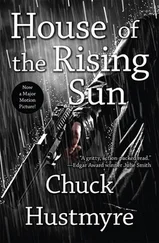Harry Collingwood - Under the Ensign of the Rising Sun
Здесь есть возможность читать онлайн «Harry Collingwood - Under the Ensign of the Rising Sun» весь текст электронной книги совершенно бесплатно (целиком полную версию без сокращений). В некоторых случаях можно слушать аудио, скачать через торрент в формате fb2 и присутствует краткое содержание. Год выпуска: 1916, Жанр: nonf_military, на английском языке. Описание произведения, (предисловие) а так же отзывы посетителей доступны на портале библиотеки ЛибКат.
- Название:Under the Ensign of the Rising Sun
- Автор:
- Жанр:
- Год:1916
- ISBN:нет данных
- Рейтинг книги:4 / 5. Голосов: 1
-
Избранное:Добавить в избранное
- Отзывы:
-
Ваша оценка:
- 80
- 1
- 2
- 3
- 4
- 5
Under the Ensign of the Rising Sun: краткое содержание, описание и аннотация
Предлагаем к чтению аннотацию, описание, краткое содержание или предисловие (зависит от того, что написал сам автор книги «Under the Ensign of the Rising Sun»). Если вы не нашли необходимую информацию о книге — напишите в комментариях, мы постараемся отыскать её.
Under the Ensign of the Rising Sun — читать онлайн бесплатно полную книгу (весь текст) целиком
Ниже представлен текст книги, разбитый по страницам. Система сохранения места последней прочитанной страницы, позволяет с удобством читать онлайн бесплатно книгу «Under the Ensign of the Rising Sun», без необходимости каждый раз заново искать на чём Вы остановились. Поставьте закладку, и сможете в любой момент перейти на страницу, на которой закончили чтение.
Интервал:
Закладка:
It was easy to see that the little man was so busy that he scarcely knew which way to turn, but he was as smiling and polite as ever, and had everything ready for me, neatly enclosed in a stout official envelope, the contents of which he turned out for my inspection. There was my railway ticket from London to Dover, my steamer ticket from Dover to Calais, my railway ticket from Calais to Marseilles, via Paris, my steamer ticket from Marseilles to Yokohama, and my credentials, which were to be presented to a certain official in Tokio, who would hand me my commission and give me my final instructions. Everything was cut and dried, even to a travelling schedule giving me the train and steamer times of departure and arrival; therefore, having looked them through and satisfied myself that nothing had been omitted, I returned the several documents to the envelope, thrust the latter into my pocket, and bade Mr Kuroda farewell. He replied with hearty good wishes for my welfare and success, expressed his deep regret that he was not going with me instead of remaining in London, shook my hand with great fervour and friendliness, and, as he bowed me out, touched the bell which was the signal for another visitor to be ushered in.
When Sir Robert came home that night, he brought with him two parcels wrapped in stout brown paper, one of them being rather long and slim; but I thought nothing of it, as I knew that it was a custom, when things were urgently needed, to have them sent to his office, so that they might be brought home at night in his car. After dinner, however, the two parcels were produced, opened, and found to contain, the one a handsome oak case containing a pair of heavy and very business-like Colt automatic pistols, with all necessary tools, bottle of oil, and one hundred cartridges; while the other was a beautiful naval sword and sheath, the blade perfectly plain but of such exquisite temper that, by exerting my full strength, I was able to bend it until the point met the hilt. The pistols were a farewell gift to me from dear Lady Gordon, while the sword was from Sir Robert. The gifts were accompanied by the heartfelt good wishes of the donors for my welfare, happiness, and safety in the strenuous times that seemed to be looming ahead, and the hope that the weapons would prove useful to me in my new service. They were, as will be seen from the account of my adventures, set forth in the following pages.
Chapter Two.
THE RUSSIAN DESTROYER.
At a quarter to eleven o’clock on the morning of December 8, 1903, I stepped out of a cab at Charing Cross railway station, and forthwith proceeded to get my luggage properly labelled and checked through to Marseilles. While I was doing this, I became aware of some one by my side, and, looking up, saw a little man, the formation of whose features and the colour of whose skin at once apprised me that he was a Japanese. He was dressed in a neat travelling suit of tweed, and wore a bowler hat and brown boots. He was reading my name, legibly painted on my sea chest, and as I looked at him he turned to me and bowed.
“You are Mr Paul Swinburne, bound for Japan?” he said, putting the statement in the form of a question, and speaking in perfect English.
“I am,” I replied. “And you?”
“I am Captain Murata Nakamura, of the Japanese army, in England on Government business, and now returning to Japan in the Matsuma Maru , the steamer in which I understand you are going out. Half an hour ago I was with Mr Kuroda, whom you know, and he told me about you, and bade me look out for you. I am pleased to make your honourable acquaintance, Mr Swinburne, and shall be happy to place my humble services at your honourable disposal.”
“Gad! that’s very good of you,” I said. “Very glad to know you, Captain. Is your baggage ready? Then, let us try to secure a compartment to ourselves and travel through together.”
“It will give me great pleasure to travel in your honourable company,” replied my new acquaintance. “And I have already secured a compartment by, as you say, ‘squaring’ the guard. There he is now. Let us go and—how do you say? Oh yes, I remember—‘interview’ him.”
We obtained a compartment to ourselves, and my new friend at once started smoking cigarettes and chatting in the most animated manner upon the prospects of war. He was in high spirits, and apparently had no doubts at all as to the outcome of the fighting—if fighting there was to be. And of this also he appeared to entertain no doubt, although there were people who still believed that either Russia or Japan would climb down and so avoid a fight.
By the time that the train reached Dover we were “as thick as thieves,” for Nakamura’s perfect frankness and his geniality of manner quickly conquered my insular aloofness toward the foreigner; and upon boarding the Channel steamer we at once went below and were busy with our luncheon almost before the boat had cast off from the pier.
At Calais, Nakamura, who seemed to speak every language under the sun, took charge of my baggage as well as his own, and by some mysterious process, probably not altogether unconnected with “backsheesh,” managed to clear the whole through the Customs in about five minutes. Then he again “squared” the guard and secured our privacy as far as Paris, where we arrived about five o’clock in the evening. There was a train leaving for Marseilles at half-past seven, so we took a cab, drove across the city, and dined at the railway station in comfort before beginning the long night journey. Then, once more securing a compartment to ourselves, we settled down for our twelve hours’ run to the shore of the Mediterranean.
I was very much amused at the naïvété of some of my companion’s remarks. He asked the most intimate questions in the coolest possible manner, and if I had not already resolved to be absolutely frank with my new comrades in arms I should have been somewhat embarrassed to find replies for some of them. He was greatly surprised to learn that I was not yet eighteen years of age, and was still growing, for although he appeared to be not more than twenty-five, he informed me that he was actually thirty-three, and I was a head taller than he, the fact being that I had a natural tendency toward bulkiness which my passion for athletics had further encouraged. He jocularly remarked that he hoped the authorities would have sense enough to appoint me to a battleship, for he was sure that in no other quarters would I find room to stand upright.
We reached Marseilles without adventure at eight o’clock on the following morning, and, after breakfasting at the railway station, chartered a cab and drove down to the Joliet, where we found our ship, the Matsuma Maru , lying alongside a wharf piled yards high with crates, bales, and cases of all sorts and sizes waiting to be stowed in the ship’s holds. The skipper was somewhere ashore, it appeared, but we hunted up the chief officer and introduced ourselves, upon which we learned that every effort was being made to have the ship ready for sea by three o’clock that afternoon, but that it would be impossible for her to get away a minute earlier than that; we therefore found the chief steward, got him to show us our cabins, and had our baggage carried aboard. Then we went ashore again and, Nakamura happening to learn that the place boasted a zoological garden, nothing would satisfy him but we must needs go there, which we did, afterwards finding our way to the handsome Museum. Then down into the town again to lunch, finally returning to the ship at a quarter to three. I had been accustomed to seeing work smartly done in our own navy, but I was amazed to see what a few hours of strenuous labour had effected upon that wharf. It was practically cleared, and even as we stood and watched, the last cases were slung aboard, and the first bell, warning visitors that the ship was about to start, was rung, whereupon we trotted aboard and took up a position on the poop, where some fifty or sixty other passengers, all men, with about half a dozen exceptions, were already congregated. Nakamura looked eagerly about him and quickly spotted at least a dozen acquaintances and fellow-countrymen, to all of whom he insisted upon introducing me; and his mention of the fact that I was going out for the express purpose of fighting for Japan at once ensured me a most friendly welcome among them. While this was going on, the ship was unmoored, and a few minutes later we were outside the harbour and shaping a course that took us at no great distance past the islet which Hugo has immortalised in his Count of Monte Christo .
Читать дальшеИнтервал:
Закладка:
Похожие книги на «Under the Ensign of the Rising Sun»
Представляем Вашему вниманию похожие книги на «Under the Ensign of the Rising Sun» списком для выбора. Мы отобрали схожую по названию и смыслу литературу в надежде предоставить читателям больше вариантов отыскать новые, интересные, ещё непрочитанные произведения.
Обсуждение, отзывы о книге «Under the Ensign of the Rising Sun» и просто собственные мнения читателей. Оставьте ваши комментарии, напишите, что Вы думаете о произведении, его смысле или главных героях. Укажите что конкретно понравилось, а что нет, и почему Вы так считаете.












